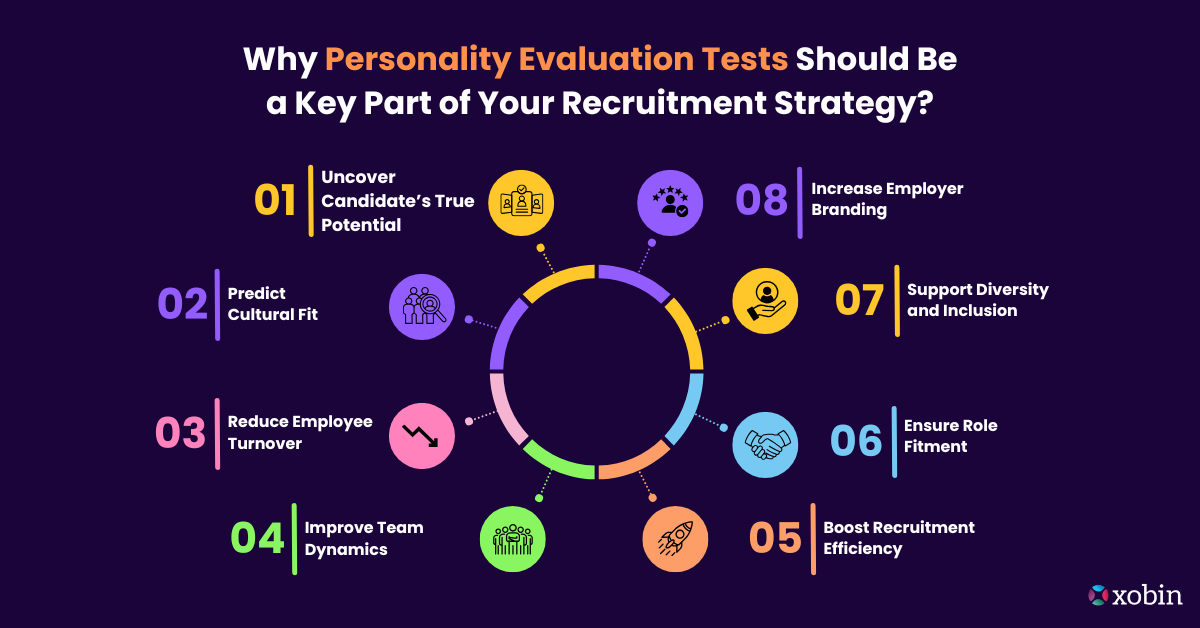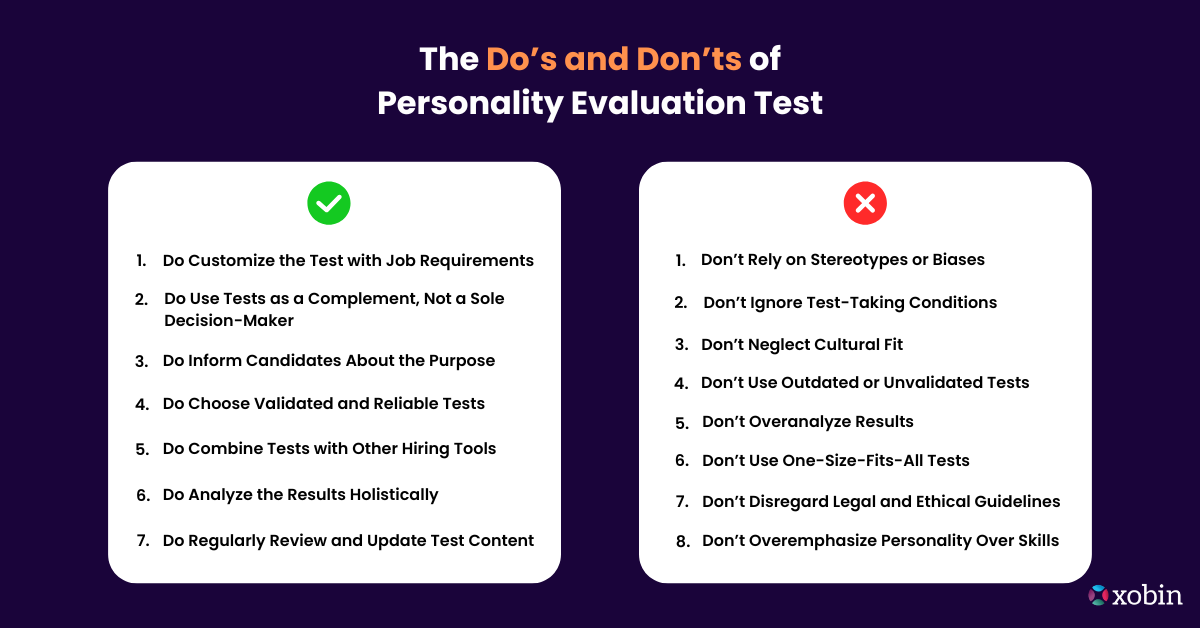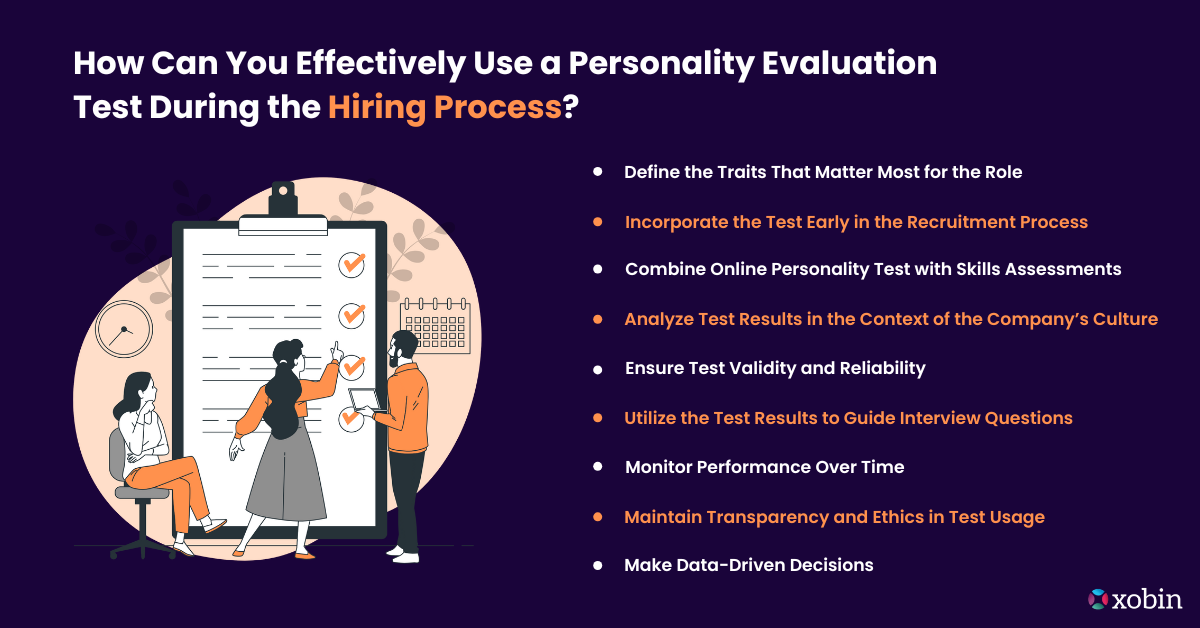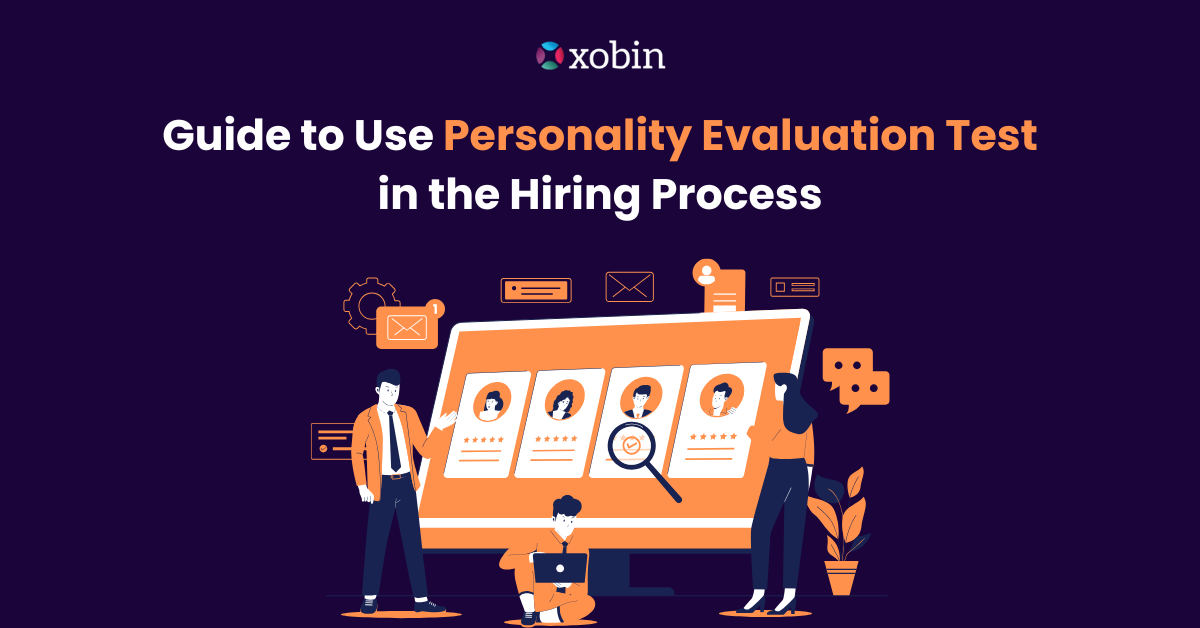Hiring the best applicant requires more than just evaluating technical proficiency and expertise. In today’s competitive job market, recruiters and HR professionals are increasingly relying on tools that help them evaluate a candidate’s personality traits. Personality Evaluation Tests have become a key part of the recruitment process, offering deeper insights into a candidate’s behavior, work style, and potential fit within a company’s culture. But what exactly is a Personality Evaluation Test, and why is it so important for hiring a candidate? This guide will walk you through everything you need to know about personality evaluation tests for hiring, from what they are to how they can enhance your recruitment process.
Table of Contents
What is a Personality Evaluation Test?
A Personality Evaluation Test is a scientific tool used to measure personality traits, behavioral tendencies, and psychological characteristics of individuals. It helps identify how a candidate is likely to think, act, and interact in various workplace scenarios. These tests are based on well-established psychological frameworks.
Key aspects assessed by these tests include:
- Emotional stability and resilience.
- Interpersonal and communication skills.
- Leadership potential and teamwork capabilities.
- Adaptability and problem-solving abilities.
By using the results of a Personality Evaluation Test, organizations gain valuable insights to make informed hiring decisions. These tests help identify candidates who are a strong cultural and team fit. They also reveal how individuals handle stress, adapt to changes, and collaborate effectively with others. Consequently, recruiters can minimize the risks tied to hiring, enhance employee retention, and build a more productive work environment. Incorporating such evaluations into the recruitment process ensures that selected candidates align with the organization’s core values and work dynamics seamlessly.
Why Personality Evaluation Tests Should Be a Key Part of Your Recruitment Strategy?

Hiring isn’t just about filling a seat. It’s about finding someone who fits the role and thrives in your organization. Imagine you hire someone with outstanding technical skills, yet they struggle to communicate or fail to integrate with the team. Not good, right? This is where Personality Assessment Tests make a difference. These tools eliminate the guesswork, ensuring you hire candidates who align with your company values and team dynamics. Include these assessments in your hiring procedure to:
Uncover Candidate’s True Potential
A resume showcases skills but falls short of revealing a candidate’s work ethic, communication style, or adaptability. To uncover these hidden traits, Personality Evaluation Tests prove invaluable. These assessments evaluate qualities like leadership, teamwork, and resilience. As a result, you gain deeper insights into how a candidate is likely to perform within your organization.
Predict Cultural Fit
Cultural alignment is critical to workplace harmony. A Personality Evaluation Test helps assess whether a candidate’s values and working style align with your company culture. It ensures you hire individuals who can thrive in your environment, reducing turnover and improving long-term employee satisfaction.
Reduce Employee Turnover
High employee turnover is often caused by a mismatch between personality and role expectations, leading to significant costs and disrupted team dynamics. Using a Personality Evaluation Test can help place the right individual in the right role. This approach not only reduces dissatisfaction but also cuts down on the expenses of rehiring. These tests assess key traits like commitment, stress management, and dependability, allowing you to identify candidates who are more likely to stay and succeed in your organization.
Improve Team Dynamics
A team is always a blend of diverse personalities. Retaining productivity requires finding the ideal balance. To achieve this, leverage a Personality Evaluation Test to assess interpersonal skills and compatibility with your existing team. Hiring individuals whose traits complement their teammates fosters stronger and more cohesive team dynamics. Consequently, your teams can collaborate effectively and achieve better results.
Boost Recruitment Efficiency
Relying solely on interviews can often be time-intensive and subjective. Incorporating personality assessments introduces an objective layer to the hiring process, making decisions faster and more accurate. With these assessments, you can quickly identify candidates who fit best, saving valuable time and resources. This efficiency reduces the likelihood of retraining or rehiring, ultimately benefiting both HR teams and recruiters.
Ensure Role Fitment
Each role demands specific personality traits. For instance, sales roles require extroversion and persuasiveness, while analytical roles demand critical thinking and focus. Job Personality tests help match candidates to roles where they can excel, increasing overall productivity.
Support Diversity and Inclusion
Diversity includes differences in cognition and behavior in addition to demographics. Personality Evaluation Tests allow for objective evaluation by emphasizing characteristics over backgrounds. This ensures an inclusive and fair hiring procedure.
Increase Employer Branding
Modern candidates value transparency and fair evaluation. Using scientifically validated tests demonstrates your commitment to hiring the right talent. This improves your business’s reputation as a top employer.
The Do’s and Don’ts of Personality Evaluation Test

Do’s of Personality Evaluation Tests in Hiring
1. Do Customize the Test with Job Requirements
Every job requires a different set of personality traits. Tailor the test to measure qualities relevant to the specific role. For example, if you’re hiring for a customer service role, focus on attributes like empathy, patience, and strong communication skills. This ensures the evaluation is relevant and accurate for the position.
2. Do Use Tests as a Complement, Not a Sole Decision-Maker
Relying solely on personality tests can lead to an incomplete understanding of a candidate. Instead, use them alongside other tools like structured interviews, skill assessments, and reference checks. This combination offers a more comprehensive evaluation and minimizes the risk of biases.
3. Do Inform Candidates About the Purpose
Clear communication fosters trust during the hiring process. Explain the purpose of the test and its relevance to the role the candidate applied for. When candidates understand its significance, they are more likely to respond honestly and engage positively. This approach enhances the overall experience, ensuring transparency and encouraging open interaction.
4. Do Choose Validated and Reliable Tests
Select tests that adhere to established psychometric standards. Using scientifically validated tests ensures accurate measurement of personality traits and delivers consistent results. This approach enables you to make informed hiring decisions based on dependable data.
5. Do Combine Tests with Other Hiring Tools
Maximize the value of personality tests by integrating them with other assessment methods. Pair these tests with structured interviews or skills assessments to gain a complete understanding of a candidate’s abilities. This strategy reduces the likelihood of missing crucial skills or traits, resulting in a thorough evaluation.
6. Do Analyze the Results Holistically
Evaluate test results as part of a broader context rather than in isolation. For example, a candidate with a low extroversion score may excel in roles that demand strong analytical thinking. Always consider the test outcomes alongside the specific requirements of the position to assess the candidate’s overall suitability.
7. Do Regularly Review and Update Test Content
As job roles and organizational goals evolve, it is crucial to maintain the relevance of test content. Regular reviews ensure that the test aligns with current hiring needs. By keeping the content updated, you improve its ability to identify top talent for your team, ultimately enhancing the hiring process.
Don’ts of Personality Evaluation Tests in Hiring
1. Don’t Rely on Stereotypes or Biases
Avoid making decisions based solely on personality test results. For example, don’t assume a candidate is unsuitable just because they score high on introversion. Focus on how their traits match the specific requirements of the role and the dynamics of your team. This way, you won’t overlook talented candidates.
2. Don’t Ignore Test-Taking Conditions
Test-taking conditions play a crucial role in influencing results. If a test is conducted in a rushed or stressful environment, the outcomes may not be accurate. Therefore, ensure applicants fully understand the instructions and take the test in a comfortable setting. This approach enables them to perform at their best, offering you more dependable insights.
3. Don’t Neglect Cultural Fit
Personality Evaluation tests provide valuable insights, but they should complement, not replace, your evaluation of cultural fit. It’s important to evaluate whether a candidate’s values align with your company culture, in addition to their personality traits. Candidates who resonate with your organization’s culture are more likely to thrive and contribute positively to the work environment.
4. Don’t Use Outdated or Unvalidated Tests
Relying on outdated or unvalidated tests can lead to inaccurate conclusions. These tests may fail to assess the traits essential for success in today’s fast-evolving workplace. Instead, select updated and validated personality tests that measure traits and behaviors relevant to contemporary roles.
5. Don’t Overanalyze Results
Although personality screening tests provide valuable insights, overanalyzing minor discrepancies in the results can hinder your decision-making process. It’s more effective to focus on broader trends and patterns rather than fixating on small details. This method ensures that your hiring decisions are based on a comprehensive understanding of the candidate’s personality.
6. Don’t Use One-Size-Fits-All Tests
Generic personality evaluation tests may not accurately assess the traits needed for every role. Each position demands specific qualities, so a one-size-fits-all test may fall short. Tailor the test to evaluate the traits most relevant to the role you’re hiring for, ensuring the results are both accurate and useful.
7. Don’t Disregard Legal and Ethical Guidelines
Always ensure your use of personality evaluation tests adheres to legal and ethical standards. Comply with data protection laws and handle candidate information securely. Failing to protect personal data or misusing it could lead to reputational harm and legal repercussions. Maintaining ethical practices is crucial for fostering trust and enhancing your employer brand.
8. Don’t Overemphasize Personality Over Skills
While personality traits are important, they should not overshadow technical skills and qualifications. A candidate’s personality should enhance their abilities, not replace the importance of their technical competence or experience. Striking a balance between personality and skills ensures that your hiring decisions are well-rounded and informed.
How Can You Effectively Use a Personality Evaluation Test During the Hiring Process?

Here’s a step-by-step guide on how companies can effectively use Personality Evaluation Tests during the hiring process:
Define the Traits That Matter Most for the Role
Before conducting any Personality Evaluation Test, it’s crucial to identify the key traits necessary for the position. For instance, a leadership role may require high emotional intelligence and strong decision-making skills, while a customer service position may emphasize empathy and adaptability.
- Tailored Assessments: Choose a test that measures the specific traits that align with the job requirements.
- Consistency: Ensure that the traits you are assessing are consistent across similar roles to maintain a standardized evaluation.
Incorporate the Test Early in the Recruitment Process
Integrating personality evaluation tests early in the recruitment process, preferably after the initial screening but before interviews, helps assess a candidate’s suitability. This approach ensures you make informed decisions, saving both time and resources by focusing on candidates who are the best fit for the role.
- Initial Screening: Use the test to filter out candidates whose personalities do not match the job requirements.
- Time and Resource Efficiency: Early-stage assessments help prioritize candidates who align with the company’s needs.
Combine Online Personality Test with Skills Assessments
While personality traits are essential, it is equally important to assess candidates’ skills and abilities. A Personality Evaluation Test should not stand alone but should complement other skills-based assessments that measure technical competencies.
- Holistic View: Use both personality and skills tests to get a well-rounded view of the candidate’s potential.
- Balanced Approach: This ensures that the candidate has the right mix of personality and skillset for success in the role.
Analyze Test Results in the Context of the Company’s Culture
A Personality Evaluation Test offers more than just insights into an individual’s traits. It can also help assess how well a candidate will fit within your company’s culture. Look for patterns in the test results that align with your organization’s values and work environment.
- Cultural Fit: Candidates whose personality traits align with the company culture tend to be more engaged, satisfied, and productive.
- Better Team Dynamics: Understanding a candidate’s personality can help predict how they will interact with existing team members, ensuring smoother integration.
Ensure Test Validity and Reliability
There are differences among personality evaluation tests. It’s important to use a test that is scientifically validated and reliable. This ensures constant and precise outcomes.
- Choose Reputable Tools: Use established and validated personality tests for hiring employees to ensure trustworthy results.
- Ensure Fairness: Select tests that are unbiased and account for diversity, ensuring all candidates are evaluated equally.
Utilize the Test Results to Guide Interview Questions
Once you have the test results, you can tailor your interview questions to explore the personality traits that are most relevant to the role. For example, if the test indicates a candidate has high levels of introversion, you might ask how they manage team collaboration.
- Informed Interviews: Use the test results to probe deeper into the traits that matter most for the role.
- Behavioral Insights: This approach helps you understand how candidates’ personality traits manifest in real-world work scenarios.
Monitor Performance Over Time
Using Personality Evaluation Tests shouldn’t be a one-time event. By periodically assessing the personality traits of employees post-hire, companies can monitor how well their hiring decisions align with long-term performance.
- Long-Term Monitoring: Use follow-up assessments to gauge how candidates’ personalities impact their performance and job satisfaction.
- Refinement of Hiring Process: Continuous data collection can help improve future hiring decisions and further tailor the hiring process.
Maintain Transparency and Ethics in Test Usage
Be transparent with candidates about the use of Personality Evaluation Tests. Ensure they understand how the results will be used in the hiring decision process, and make sure the tests are administered ethically.
- Candidate Trust: Transparency helps build trust with candidates, ensuring that they feel respected throughout the process.
- Ethical Testing: Adhere to ethical guidelines to ensure fair treatment of all candidates, avoiding any misuse of personality data.
Make Data-Driven Decisions
Once you have gathered insights from the Personality Evaluation Test, combine them with other recruitment data to make informed decisions. This data-driven approach increases the likelihood of making the right hiring choices.
- Data Integration: Use personality test results in conjunction with other metrics like experience and skills to make well-rounded decisions.
- Reduced Bias: Relying on objective data rather than gut feelings helps reduce unconscious bias in the hiring process.
What are the Best Personality Evaluation Tests for Hiring?
1. The Big Five Personality Test (Five-Factor Model)
The Big Five Personality Test is one of the most widely researched and scientifically validated tools for personality evaluation. It measures five key traits:
- Openness: Creativity and willingness to embrace new ideas.
- Conscientiousness: Organization, reliability, and attention to detail.
- Extraversion: Sociability and energy levels.
- Agreeableness: Cooperation and empathy towards others.
- Neuroticism: Emotional stability under stress.
This test is ideal for assessing whether candidates possess traits suited for roles requiring teamwork, innovation, or resilience.
2. DISC Personality Assessment
The DISC Personality Assessment focuses on understanding how individuals behave in workplace environments. It evaluates four primary dimensions:
- Dominance: Results-oriented and driven.
- Influence: Social and persuasive.
- Steadiness: Patient and team-oriented.
- Conscientiousness: Analytical and detail-focused.
Recruiters often use DISC to identify leadership potential and communication styles, making it a valuable Personality Evaluation Test for roles in management or sales.
3. The 16 Personality Factor Questionnaire (16PF)
16 Personality test is a comprehensive Personality Evaluation Test that evaluates 16 personality factors, which can be used to predict work-related behavior, teamwork compatibility, and leadership potential. The 16 factors include:
- Warmth, Emotional Stability, and Boldness
- Vigilance, Reasoning, and Abstractedness
- Sensitivity, Apprehension, and Openness to Change
This test provides an in-depth personality profile, which makes it ideal for a broad range of recruitment purposes, including team-building and leadership development. HR professionals can use it to assess how a candidate might approach tasks, solve problems, and adapt to workplace changes.
4. Culture Add Online Test
Hiring for cultural fit is outdated. Modern recruitment emphasizes cultural add, where candidates bring unique perspectives and values that enhance the workplace. A Culture Add Online Test evaluates a candidate’s alignment with your organization’s vision while valuing diversity.
- Promotes Inclusion: Attracts candidates who complement, rather than replicate, your current workforce.
- Boosts Retention: Employees aligned with company values are more likely to stay longer.
This test helps you identify team players who contribute to a dynamic and innovative work environment.
5. Situational Judgement Test (SJT)
The Situational Judgement Test (SJT) evaluates how candidates handle real-world workplace scenarios. This test measures:
- Problem-solving skills: How effectively candidates analyze challenges.
- Decision-making abilities: Whether they make ethical and practical choices.
- Interpersonal skills: How well they collaborate with others in high-pressure situations.
Recruiters often use SJTs to assess soft skills such as conflict resolution and adaptability, which are critical for customer-facing or leadership roles.
Conduct Personality Evaluation Tests with Xobin!
At Xobin, we recognize that hiring the right talent requires more than just technical expertise. To help you identify the best cultural fit and evaluate the personality traits that drive performance, we have a comprehensive Personality Evaluation Test.
Incorporating a Personality Evaluation Test in your hiring process allows you to assess candidates holistically. With Xobin’s powerful features, you not only ensure that you’re hiring the right skillset but also the right personality for your team’s success.
Moreover, Xobin’s personality tests are scientifically validated, ensuring that results are reliable and predictive of job performance. With our vast skills inventory and job test portfolios, including personality screening assessments, we empowers you to make smarter, data-driven hiring decisions. This leads to a more efficient, effective, and inclusive recruitment process.
Take the next step today! Book a Personalized Demo to get started!






